
Waste management
The municipality offers a collection service to all residents. The compost is for organic matter, recycling for recyclable materials as well as garbage or ultimate waste.
The goal is to recycle and compost as much as possible in order to reduce tonnage sent to landfills and thereby reduce costs. Know that you play an important role.
How to use or place them?
- It is important to put the wheels and handles toward the property and not to the road. If your bin is in the opposite way, it may be damaged during mechanical lifting by the collector.
- Place your bins set back from the public road in your entrance.
- Ensure that no vehicles or other objects interfere with the mechanical lifting of the bins.
- Do not leave any waste on the lid and make sure that the bin is closed and that nothing is protruding. A half open cover may be damaged during mechanical lifting.
When to place them along the street?
- Place your bins at the road between 7 pm the day before and 7 am on the day of collection.
- Remove them after collection the same day.
Winter days
- Take out your bin on the morning of collection only. You will make life easier for snow removal operators.
- Never place your bin behind the snow banks. The latter must be easily accessible to the operator.
Overweight
Bins that are too heavy (more than 90 kg or 200 pounds) or whose residues overflow 20 cm or more will not be picked up.
Extract from by-law 339-2012
Identification of the bins
- No person shall alter, conceal or remove the identification number and the logo of the municipality, if any, affixed to a container provided by the municipality. Only the civic address can be entered.
Containers distributed by the Municipality, whether for free or for a fee, to the serviced and partly served units must remain on the property to which they are linked despite a change of ownership.
* The contractor shall not be required to remove residual material containers when the container is overfilled so that the lid does not close or the weight exceeds the capacity of the container.
* In the event that the occupant has forgot to put his bin at the side of the road the day of the collect, he is responsible for disposing of his residual materials and at his own expense.
Where are the materials from the four-way collection processed?
Organic matter and landfill residues are transported to the Coaticook composting platform and landfill, which are managed by the Inter-municipal Solid Waste Management Board in the Coaticook region. Recyclable materials are sent to the Régie de récupération de l’Estrie.
As part of the implementation of the PGMR, the MRC recently produced and published some capsules on the management of residual materials, intended for citizens.
You can also visit the site of ABC du BAC
The brown bin or organic materials
Any residual matter of an organic nature, mainly from table waste and food preparation, as well as green waste.
A ton of waste costs more than $ 100 to bury while the cost to compost a ton of organic material is $ 50.
Only certified paper and compostable bags are allowed to be placed in the brown bin. Biodegradable or oxo-biodegradable bags are prohibited.
Here’s a table of compostable materials to drop into your brown bin.
- Fresh, frozen, dried, raw, cooked, prepared or expired cooked residues
- Fruits and vegtables
- Bread, cereals, pasta, cake
- Meat, fish including bones
- Dairy products
- Egg shells
- Coffee filters and tea bag
- Food leftover
- Nut shells
- Fat
- Candy and dessert
- Cut grass
- Flowers and plants
- Leaves
- Conifer needles
- Bad weed
- Indoor plant, including potting soil
- Small branches (maximum 2 cm / 3/4 po. big and 60 cm / 2 pi. long)
- Saw dust
- Bark
- Wood shaving untreated and unpainted
(impregnated or soiled with non-toxic products)
- Paper and cardboard
- Paper plates
- Naokins
- Tissues
- Paper towel
- Hand paper
- Paper placemats and tablecloths
- Pizza box
- Muffin paper
- Shredded paper
- Cold or wet ashes
- Cat litter
- Newsprint or chip wood for pets
If you would like more information or tips, please visit ABC du BAC
Go see these capsules, they are instructive and interesting :
The blue bin or recyclable materials
All residual materials that can be recycled to be reintroduced into a production cycle.
It is largely paper, cardboard, glass, metal and plastic. A ton of recovered paper saves 18 trees while 90 bottles of plastic can turn into a two-seater tent.
Here is a list of recyclable items:
- Box of eggs
- Flat or corrugated cardboard boxes
- Cereal and tissues box
- Box of laundry soap
- Shoes box
- Unwaxed frozen food box
- Carton of milk and juice
- Individual juice carton (without straw)
- Aseptic Container (Tetra Pak®)
- Regular envelope and with window
- Sheet and paper bag
- Newspaper, magazines, flyers
- Phone book
- Unstained paper tableclothes
- Paper
- Non metallic wrapping paper
- Silk paper
- Shredded paper (bagged in transparent, knotted bag)
- Paper and brown bag
- Cardboard roll
- Cardboard glass
- Bottle
- Container
- Bag, bubble wrap and packaging film (eg cheese wrapping, toilet paper, Saran Wrap, grocery bag, milk, bread, sandwich, etc.).
- Packaging of food, beverage, cosmetics, personal care and housekeeping products identified by one of these symbols
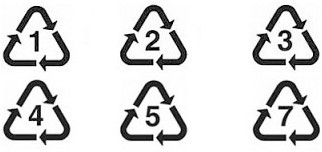
- Pot and glass bottle with or without label
- Glass or clear glass bottle
- Soft drink bottle
- Clean aluminum plate
- Cans
- Aluminium cans
- Metal lid and pans
- Clean aluminum foil (packed in a compact ball)
- Metal Piece: Max. : 2 kg | length min. : 5 cm | length max. : 60 cm
Watch the following capsules:
Glass recovery
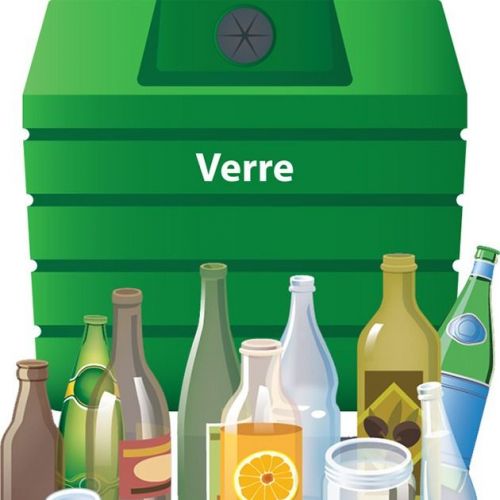
Drop off your glass bottles at
201 Narrows Road (Forand Park)
The container dedicated to glass recycling is accessible to the population. You can deposit your glass bottles, jars and bottles there so that they can be recycled as much as possible.
Glass is infinitely recyclable. When you put it in the blue bin, this material is contaminated by ceramics and paper, among other things. Selective collection does not meet the requirements because of its contamination. Given the complexity of operations and the lack of profitable outlets, 65% of the glass from Quebec’s sorting centers is sent to landfill sites to be used as a path for trucks or to cover waste.
Recycled glass is used, among other things, for :
- the manufacture of bottles and containers;
- the manufacture of insulation products;
- aggregates used in the manufacture of concrete;
- filtration;
- abrasives.
Eligible materials in the glass container
Only packing glass is accepted in the container. This type includes any bottle that has contained food or liquids (wine bottle, jar of pickles, jar of jam, etc.).
Please note that culinary glass (transparent dishes and crockery) is not accepted because it is transparent ceramic. Porcelain, stoneware, tiles, stones, cement, metals and special glasses (reinforced glass, windshields, TV screens, light bulbs, etc.) should be put in the household garbage or deposited at the ecocenter.
Bulky items
Any residual material of domestic origin that is too bulky to be placed in the appropriate bin due to its large size, shape or weight.
Take note that the municipality no longer offers the bulky item door-to-door. On the other hand, there are two possible options, see the sections: La Ressourcerie des Frontières or the Ecocentre of Magog.
Hazardous household waste or HHW
HHWs are products that contain substances harmful to human health and the environment.
These products are all likely to cause harm to health or the environment, their use, storage or inadequate disposal.
The municipality, in collaboration with the Régie intermunicipale de gestion des déchets solides of the Coaticook region, invites you to dispose of these products once or twice a year. The collection calendar lists dates and locations. Other times you are invited to go to the Régie’s site at 1095 Bilodeau Road in Coaticook, Barnston area or the Magog Ecocentre (see ecocentre section).
Here is a list of hazardous domestic residues:
- Ammonia
- Furniture waxes
- Furnace cleaners
- Metal cleaners
- Fondue fuels
- Pipe cleaners
- Scouring powders;
- Frictional alcohol
- Hair dyes
- Hair sprays
- Medicines
- Toiletries
- Nail varnishes
- Solvents
- Softeners
- Stain removers
- Bleach
- Solvent-based adhesives
- Paint strippers
- Stacks, dyes
- Varnishes
- Wood preservatives
- Solvents
- Muriatic acid
- Aerosol
- Antifreeze
- Automobile batteries
- Propane tanks
- Creosote
- Chemical fertilizers
- Lighter or other gasoline
- Used oils and filters
- Coolant
- Pesticides
- Pool products
- Compact fluorescent bulbs
- Fluorescent tubes
- Explosives and ammunition
How to Recognize HHW
According to Health Canada, products are considered hazardous if they have any of the following: toxic, flammable, corrosive or explosive. Each of these features is associated with a symbol.
Source : Health Canada
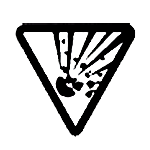
Explosive
This container may explode if heated or punctured. Metal or plastic shards can cause serious injury, especially to the eyes.
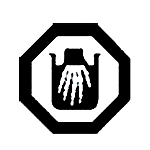
Corrosive
This product burns the skin or eyes as soon as it comes in contact with them. If ingested, it burns the throat and stomach.
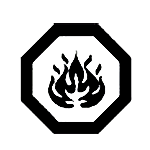
Flammable
This product, or its vapor, may be easily ignited in the vicinity of sources of heat, flame or sparks.
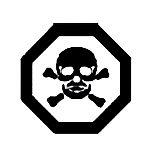
Toxic
This product can cause illness or death if it is licked, ingested or drank and sometimes it is simply inhaled.
La Ressourcerie des Frontières
To lighten your cupboards, your garage or even your basement, call La Ressourcerie.
La Ressourcerie des Frontières is a company that collects your objects free of charge directly from your home throughout the year. The activities of Ressourcerie will be concentrated around the recovery of objects in order to enhance them by re-use or recycling.
La Ressourcerie is a free service offered to all citizens of the Township. Want to get rid of items that are no longer suitable for you or are no longer working?
- Furniture of any kind (upholstered or not), mattress, box spring
- Appliances, large and small (refrigerator, food processor, etc.)
- Electronic and computer equipment (TV, computer, cellular, satellite dish, etc.)
- Various equipment (air conditioner, water heater, etc.)
- Terrace and garden items (barbecue, swing dismantled, etc.)
- Home, leisure and workshop items (crockery, glassware, trinkets, lighting, mirrors, games, toys, books, CDs, tools, etc.)
- Sporting goods, including bicycles
- Baby items
- Toilet, washbasin, bath, shower, etc.
- Reusable building and renovation materials (unused tiles, new plywood sheets, unused logs, etc.)
- Windows (except thermos), windows, doors, gutters, etc.
- Dismantled car shelters
- Automotive items (alternator, battery, engine, etc.)
- Electric wires
- Metals
- Textiles, textiles, clothing, footwear
- Cardboard boxes
- Hazardous household waste (oil, paint, pesticide, battery, fluorescent lamp, neon, propane tank, fire extinguisher, etc.)
- Residues and other organic matter (leaves, grass, branches, etc.)
- Aggregates (rock, concrete, sand, asphalt, concrete slab, etc.)
- Asphalt Shingles
- Materials from demolition of buildings (wood with nails, old tarpaulin, vinyl coating used, etc.)
- Windows and doors
- Objects of unusual weight or size (trailer, piano, sailboat, manure spreader, etc.).
- Tires
Some fees may apply for collection. See the rates for collecting bulky items. GRILLE DE TARIFS 2019 – Ressourcerie des Frontières
All bulky items are recovered regardless of condition, whether functional or not. Cases of insalubrity are the only exceptions because of the safety and health of our valorists.
Procedure for the collection service
- Contact the Ressourcerie des Frontières:
- Telephone: 819 804-1018
- Toll free: 1 855 805-1018
- Email: info@ressourceriedesfrontieres.com
- Give as accurate a list as possible of the items to be picked up in order to estimate the space required to reserve in the truck and provide your contact information.
- According to the partner municipalities, allow 3-8 weeks for the truck to pick up your bulky items. La Ressourcerie des Frontières will contact you 2 days before the collect to inform you of the exact date of collection.
- Prepare your articles for collection:
- Place small items in boxes or bags
- If possible, wait until the day of collect to pick up items outside your home
- Place items outdoors, protected from the rain or snow or covered with a tarp, in an easily accessible location for the truck.
Note that for insurance reasons, our drivers are not allowed to enter your home at the time of collection, unless you have reached an agreement with us
To deliver your articles to the Ressourcerie
- Store all your items in easily transportable containers (boxes, bags) for easy storage.
- Introduce yourself at 177 Cutting Street in Coaticook (behind the store) at the designated door during opening hours: Monday to Friday from 8 am to 4:30 pm and Saturday from 8 am to noon.
- A valorist will welcome you and take note of your location (proof required i.e.: municipal taxes bill)
It is strictly forbidden – at all times – to leave items outside the building, as well as to place them in containers.
The Magog Ecocentre
We are affiliated with the Ecocentre since the end of 2016. It is a place where you can drop several items.
To get there, you must be registered by the municipality and the municipality will give you a card that you will have to present once at the ecocentre. The membership fee for 2024 is $ 40 The tariff may change each year according to the agreement.
Here is what you can bring, please note that some items will be loaded):
- Metals
- Computer hardware
- Tires without rims
- Hazardous household waste (free)
- Clothing (free)
- Oversized selective collection material (free)
- Green waste in bulk (30$ /m3)
- Separate and pruning trimmings attached in packs, natural wood ($ 30 / m3)
- Couch, mattress, futon ($16 / per item)
- Garbage (60$ / m3)
- Construction materials and other materials, by truck ($ 30 / m3)
Contact information
2300 Tanguay Street (industrial park)
Magog, Quebec J1X 7K3
Tél. (day) : 819 843-3333
Tél. (weekend) : 819 847-0835
Opening hours (ecocentre)
April 2 to November 30, 2024
- Tuesday and Wednesday: 8:30 a.m. to 3:30 p.m.
- Thursday: 8:30 a.m. to 7:00 p.m.
- Friday, Saturday and Sunday: 8:30 a.m. to 3:30 p.m.
La Régie intermunicipale de gestion des déchets solides de la région de Coaticook
The Régie’s site is at your disposal for several services:
- landfill,
- composting,
- recycling of all kinds,
- the ecocentre, where the recovery of hazardous household waste (paint, battery, computer equipment, etc.)
- collection of building materials
Re-use shelter
Maximum 20 minutes per visit per day.
Opening hours
From January 4th to March 15th 2019
Friday 9 am to noon
From March 19th to November 15th 2019
Tuesday and Friday 9 am to noon
From November 22nd to March 13th 2020
Friday 9 am to noon
*Closed on Holydays
Garbage, ultimate waste, black bin or other containers
Any residual material destined for landfilling that can not be recovered or upgraded. It is said to be the ultimate waste.
As of July 1st , the rolling garbage bin (black or green) becomes mandatory. The municipality offers the possibility of purchasing a bin (360 liters) for $110 (prices subject to change). Otherwise, you can buy a bin at the store of your choice, but make sure you have a rolling bin that can be picked up by mechanized trucks. The bin must be black or green, but not blue or brown, these colors are reserved for the recycling and compost bin.
Be aware that it is forbidden to dispose building materials. To dispose these, please rent a container or bring it to the ecocentre or the Régie de Coaticook.
Reduce your waste at the source?
The easiest waste to manage for the municipality and for you is the one that is not produced.
If you want to reduce your ecological footprint and the landfill costs, think about the order suggested by the acronym 3RV. Try to Reduce your consumption as much as possible, for example by choosing products with less packaging or by not acquiring new products if you already have something that could do the job well. Whenever possible, Reuse products, such as grocery bags that can be used as small garbage bags such as those used in the bathroom. Once these two steps are achieved, check if the product can be Recycled, then check if it can be Valorized (if it can be composted). Finally, if none of these steps apply, you are in the presence of an ultimate waste.